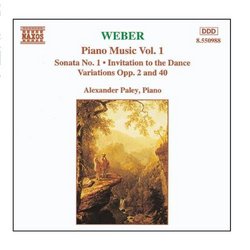"Has he written for the piano, too?"
Hexameron | 05/07/2007
(5 out of 5 stars)
"Franz Liszt asked Wilhelm von Lenz this question when von Lenz first introduced Weber's piano music to him. It's not surprising at all, especially during that time period, to think of only Der Freischutz or Euryanthe when the name Weber was mentioned. It might not even be unusual today for your average classical music lover to think of Weber as only the composer of grand German operas. Thankfully, Naxos seeks to annihilate all presumptions about Weber with their four volumes of his piano music, which proves to be just as brilliant, melodic and original as his operas.
"Has there ever been manifested greater genius in the handling of the piano, than is found in Weber's first Sonata - the one in C major?" Wilhelm von Lenz rhetorically asks this in his book, The Great Piano Virtuosos of Our Time: A Classic Account of Studies with Liszt, Chopin, Tausig & Henselt. After sampling this scrumptious Sonata myself, I can well believe von Lenz's enthusiasm. This is truly a remarkable piano work, even with Beethoven up for comparison. The first movement bonds Mozartean sweetness and Beethovenian tension with Weber's own grand and stunningly virtuosic style. In the Adagio, Weber writes in an operatic manner that foreshadows the bel canto emphasis of the early 19th century virtuosos. Structurally, the Minuet's themes are overly repetitive, but like M&M's, I'm happy to eat these melodic ideas more than once. The last movement which helped coin the Sonata "Perpetuum Mobile" is indeed rapid and unyielding. It wouldn't surprise me if there were no rest markings at all in the score. The virtuosic content of this movement was so impressive that Tchaikovsky and Brahms made their own arrangements. As a fanciful flurry of undying notes, it is definitely a tour-de-force. Weber never abandons good melody or drama either, which supports von Lenz's praise that this entire Sonata is quite original if not manifested genius. It should be noted that Alexander Paley is unbelievably flawless in his execution of this thrilling piece.
Of the two sets of Variations recorded here, it's obvious that the mature work, the Op. 40 "Variations on a Russian Theme" should garner the most acclaim. The Ukrainian melody, 'Schone Minka' is simple but memorable, and Weber takes it through some emotional adventures. Sir Julius Benedict, one of Weber's composition students, thought Weber's variations of this theme "ingenious, though the predominant minor key in seven of the variations gives the whole a rather monotonous melancholy tinge." I was actually glad to see a Classical Era variations work emotionally centered on gloom and angst. In fact, I think Weber's manipulations and re-workings of the theme are solid, if not unique. The Six Variations on an Original Theme Op. 2 were written in 1800 and are not bad, considering Weber was thirteen when he wrote it! Although shrouded in a Classical cloak, Weber's humble and youthful variations remind me of Mendelssohn's early piano pieces.
Weber's "Invitation to the Dance," while somewhat obscure today, was once a war-horse featured in every great pianist's recital. It's understandable, I suppose, how this witty and attractive waltz became Weber's most popular piano piece. According to Naxos's liner notes, "It is the first concert waltz ever written, the first composition in waltz rhythm composed to be heard and not to be danced to..." Alexander Paley's valiant efforts are always impeccable, and he really highlights on the charmingly mischievous but elegant music.
Bottom line: You can certainly find recordings of Weber's piano music, and his Sonatas have had some fine champions, notably Garrick Ohlsson and Constance Keene. I haven't heard the latter, but Naxos's Alexander Paley plays with such extraordinary sensitivity and strength, that I must ardently support his interpretations. The addition of the two Variations, of which the Op. 40 is the greatest, are also wonderful treats to this first volume of Weber's Piano Music. Since Amazon doesn't offer it anymore, buy it used while you still can."


 Track Listings (7) - Disc #1
Track Listings (7) - Disc #1